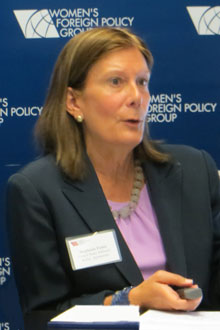Women in Afghanistan: Progress and Challenges
Stephenie Foster, Women and Civil Service Officer,
US Embassy, Kabul, Afghanistan
Photos

Washington, DC—On April 15, 2013 Stephenie Foster, a women and civil society officer at the US Embassy in Kabul, Afghanistan, spoke with WFPG members and guests at a brown-bag luncheon on “Women in Afghanistan: Progress and Challenges”. Foster discussed her work and time in Afghanistan, as well as the strides Afghan women have made in the last twelve years. She highlighted the importance of investing in girls’ education, women’s economic and political empowerment, and security. Foster also discussed the concerns of Afghan women about 2014 with the upcoming foreign troop withdrawal and the presidential and parliamentary elections.
Foster discussed Secretary of State John Kerry’s recent stop in Afghanistan, where he met with several prominent Afghan women entrepreneurs. This meeting demonstrated the United States’ continued interest in advancing women’s rights in Afghanistan, especially on the heels of Hillary Clinton’s work in making women and girls a foreign policy priority. Foster also touched on the recent bombing that killed 25-year-old FSO Anne Smedinghoff, commenting that the tragedy was a harsh reminder of the security risks that come with working in a country in conflict.
Foster stated that the news reporting that comes out of Afghanistan is often overwhelmingly negative, which does not adequately reflect the progress Afghan women have made. Women in Afghanistan have made many important strides in the last twelve years. Today, nearly 40% of girls are attending school, and there are record numbers of women entrepreneurs. Foster noted how amazing this progress was considering the situation that women and girls experienced under the Taliban. However, women and girls in the region still face issues of violence and forced marriage and have limited legal recourse in the traditionally patriarchal court system.
With 2014 approaching, Afghanistan is preparing for a transition and many fear that the Taliban will return to power. Foster remarked that one of the greatest barriers to Afghan women’s empowerment is security. She commented that many local women and activists fear that any increased influence of the Taliban will diminish the progress made in women’s rights. Additionally, as Afghanistan prepares for next year’s election, Foster stated that including women in planning stages was essential to ensure voter accessibility and security and to minimize corruption.